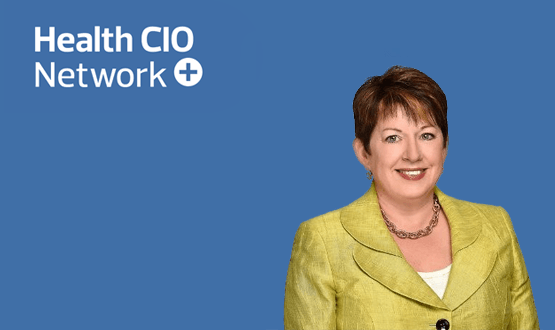In our latest CIO interview, Digital Health News speaks to Shauna McMahon from Frimley Health NHS Foundation Trust who talks about why she believes the transformation of culture within the NHS will be a significant development in healthcare over the next year, and why she would want Bette Midler to play her in a film about her life.
Why did you become an NHS CIO?
I want to make a difference in the lives of the care providers and the citizens we serve. Technology as an enabler in healthcare is a game-changer and an exciting field to work in. There is always something new to learn and I am motivated by helping others.
When did your interest in IT begin?
When I left university I took the time to work in different businesses and eventually was asked to do a business change project, which required fully digitising the process across a number of hospital sites. I loved interfacing with the technology and business side and seeing the impact on the clinicians and patients. I just kept doing more and more in the area and stayed with it. I like the strategy, planning and art of the possible most for business transformation most.
Within your organisation, what is the most significant digital achievement of the past 12 months?
I have been with the trust for two and a half years. We have done a number of projects, but overall I would have to say three that have changed the approach of digital at the trust. One, getting board support to adopt a cloud-first strategy; second, with the merger of Wexham and Frimley – the team has worked to consolidate to one trust team. This has been challenging but rewarding transformation. Our digital services team will all be consolidated in one building in September this year, serving three hospital sites and our community locations.
The focus on cyber security has been inherent in the team and while we still have a lot of work to do, our approach to our infrastructure meant we were not affected by the WannaCry cyber attack. We have a fully funded cyber security analyst in post. Hmmm…that is three things!
What will be the most significant development in healthcare over the next 12 months?
I believe it will be the transformation of processes and culture to enable the amazing opportunities of digital, to not only positively change the lives of patients but also ensure that the funding for healthcare is being maximised to achieve the most effective use across the system. The system view is likely to be the most significant advancement that will have a significant impact.
What’s the largest barrier to being a more effective CIO?
The CIO in many industries is sitting at the board table on the executive team reporting to the CEO. Organisations are ‘digital’ and the digital knowledge is core to the decisions and way forward. Healthcare seems to be still hanging onto to old models. The CIO is a profession. Current trend now is that organisations are appointing CIOs as their COO, as they have acquired that systems view in their career. Being seen as a business strategist that effectively uses digital solutions to impact the business and not ‘the IT person’ is a fundamental shift that is needed. We all need to support a change with the current mindset. Healthcare needs a real shake-up to be seen as a modern industry.
What’s the largest barrier the NHS faces overall in achieving digital transformation?
The NHS is steeped in following ‘the rules’ and traditional approaches, with an unhealthy focus on assurance and reporting, some of which is out of date for the digital age. This is counterintuitive to a digital culture. You have to take some risks, break some rules to leverage the innovation that technology can provide.
That is not to say assurance is not needed, but we are rich in data, yet seem poor in good analysis that is prioritised and support efforts that will make system-wide impacts on a large scale.
More public engagement on how digital solutions can help improve their health and wellness and reduce their stress. The current system (old processes) puts too much stress on the people coming for help. We must do better – be customer-focused, not provider-focused so much.
If you have one piece of advice for other NHS CIOs, what would it be?
Having the courage to push boundaries, and create a culture of innovation as well as becoming well-rounded business leaders. Think CIO/COO/CFO.
Who in the NHS do you admire the most and why?
The care providers and others that work so hard in the system every day and night to help people when they are at their most vulnerable. Their commitment, tireless efforts, and how difficult their jobs are is not well understood by the general public. It takes a special type of person to do what they do. Until you have worked in healthcare, you cannot fully appreciate the complexity. In my experience, having worked in private and public sector, I would say healthcare is like no other business.
If you were given £30 million to spend on digital transformation within your trust, where would that money go?
I would use the funds to back-fill care providers so they could engage in shaping the digital environment more. [I would also] host more community events where we help citizens learn to use the digital tools they have (smartphones, wearables) to help them manage their own health. I believe this is yet to be fully tapped into and that we need to empower the public to be partners and managers of their health.
It would be great to have community drop-in sessions on a bigger scale, where digital experts could work with the public to shape how they want to have healthcare delivered.
What is the most over-hyped digital innovation in health?
Document imaging. It is not the most groundbreaking use of technology.
What is the most under-rated digital innovation in health?
The importance of interoperability – open-source models for data and the exchange of information. All this technology should enable us to get better information that can drive improved decision making for running health care, treating people and improving health outcomes for our citizens.
Creating an environment of sharing in the public sector is critical to leverage the best gains for all the tax dollars spent. Having open standards that enable the health organisations and funders to have independent ability to use the data should be mandatory.
What’s the worst job you’ve ever had and why?
I believe all the jobs I have had have shaped where I am today. I can’t really think of a worst job. If I had to pick one that I felt did not align with my internal compass – it was as a human resources consultant doing outplacement work. I had to tell managers and executives or sometimes full business operations that their jobs were being terminated. It toughened me up, but while not my true calling, was heart-wrenching at times.
If you could travel back in time to meet one person, who would it be?
Nelson Mandela. I enjoyed the book –Leading like Madiba: Lessons of Leadership from Nelson Mandela
What’s the last song you listened to (be honest!)
Nathaniel Rateliff & the Night Sweats – S.O.B
What’s your favourite piece of technology at home and why?
My Bose Bluetooth speaker and wireless headphones. I love music and book tapes so they get lots of use at home, hiking and travelling.
If you could have any other job, what would it be?
I have always loved art and cooking – so either a painter or recipe tester, or food writer. Not a chef, as the hours are terrible!
In a film of your life, who would play you?
It would be Bette Midler. Her humour, sass, tenacity, courage in combination with her big heart would be a good match. Too bad I can’t sing like Bette, so I would love her to do the singing.



10 July 2018 @ 18:26
Great piece, Shauna. We need to get you back in Novey to innovate here. How about genetic insights at the heart of digital medical records?
Scott L